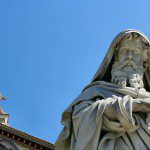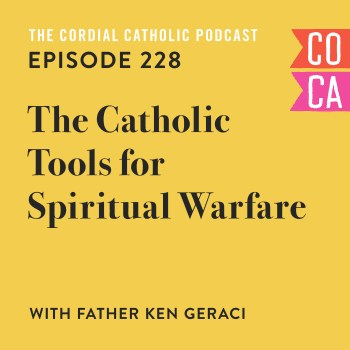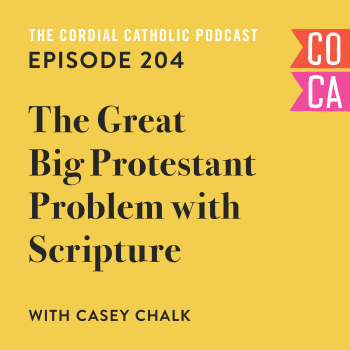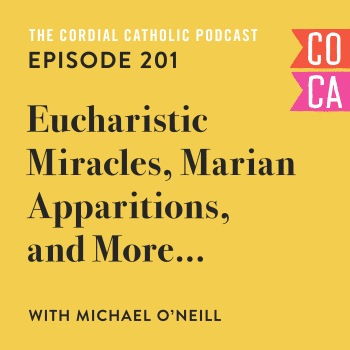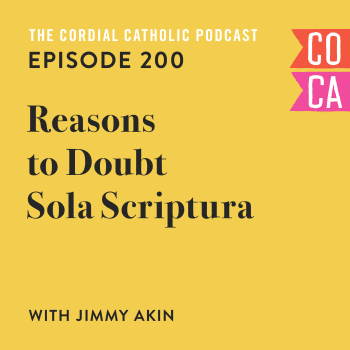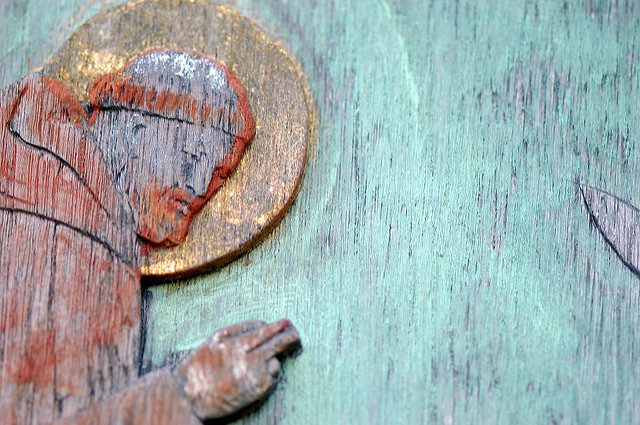
It was a Sunday morning after our ten o’clock service. I was in my final year of high school, maybe first year of university. It was billed as, I think, a “family Bible study” and part of a rigorous Adult Sunday School program which my Pentecostal church took great pride in.
It was my first encounter with praying to the dead.
The Senior Pastor leading the Bible study was working his way, slowly and methodically, through the anonymous Letter to the Hebrews. He was meticulous.
I can remember it clearly: sitting in the new chapel, an addition to the main part of the church that had just been recently completed. Back row; a seat in the middle.
I remember, clearly, because I had a question to ask.
A question to ask of the Senior Pastor. The brightest Bible-knowing guy that I knew.
It was a bit nerve-racking.
I’d been chewing on my question for weeks as the passage in Hebrews approached. As a diligent, zealous, and self-identified Bible scholar, I hadn’t been able to find a satisfying answer anywhere else.
It would be a question asked only after painstakingly trying to find the answer for myself first.
So, when the Pastor read aloud the words of Hebrews 12:1 I steadied myself,
Therefore, since we are surrounded by such a great cloud of witnesses, let us throw off everything that hinders and the sin that so easily entangles. And let us run with perseverance the race marked out for us.
“What does the author mean by ‘a great cloud of witnesses’?” I asked, when it was finally time for questions.
Funny, I don’t actually remember what the pastor said in response.
I do remember, for having whipped myself up into such a frenzy over actually asking a question, being incredibly disappointed by the response.
I do remember, too, being surprised that no one else asked it—or that no one else was as dissatisfied with the answer as I was.
Was it just me?
This was my first encounter with what the ancient churches call the Communion of the Saints: that, contrary to what many Protestant churches teach, the Christian dead are not tucked away behind an impenetrable curtain but instead part of a living, active Communion.
The Church.
What I did not know at the time, as a budding Bible scholar, was what the author of Hebrews was getting at was what the very first Christians believed, and what these ancient churches (Catholic and Orthodox) still believe today: That there are departed Christians who stand, still, as witnesses to our faith.
That we can pray to the dead.
Two quick distinctions need to be made.
First among them is that the notion of praying to is kind of a failing of the English language.
When I say we “pray to” the dead I do not mean I believe the dead have the power to answer prayers. When we, Catholics, say we’re “praying to” someone other than God we mean we asking them to pray for us.
Someone who says they’ve “prayed to St. Francis,” means, more clearly, that they’ve “asked St. Francis to pray for them.”
Catholics, by and large, know this. But the nomenclature is confusing.
The second distinction to make is that none of this makes sense if you do not believe that Christians, dead and alive, are part and parcel of the same Holy Church.
If the Christian dead are obscured from us by an impenetrable veil then my asking them to pray for me has no effect and the practice, instead, is a bit too much like fortune telling or witchcraft or what the Bible lovingly refers to as soothsaying.
That when we say, “pray to,” we mean “ask them to pray for us,” and that we believe that all Christians, dead and alive, are still part of the same indivisible Church, is important to understand.
So, why do we pray to dead people?
Because that’s what the Church has always taught.
If my encounter with the “cloud of witnesses” in Hebrews 12 began the conversation for me it was digging deeper into the history of the Church that led me to a clearer understanding.
Since the very beginning of Christianity, Christians in leadership believed that the dead had the ability to pray for us and that the Christian dead—especially those early holy martyrs—held a special place in communion with those Christians alive on earth.
We see a ringing example of this in the practice of the Early Church who built their church buildings on the bones of the great saints. On the bones of St. Peter and St. Paul in Rome, for example.
Or the example, often terrifying to non-Catholics, of the veneration of the relics of deceased Christian saints recorded in the writings of the Early Church Fathers as early as 150AD.
In both of these cases early Christians were essentially, praying to the bones of their dead Christian brethren.
These Christians believed in that their deceased brothers and sisters could still pray for them and they asked them for prayers, in a serious way. By burying their bones underneath the places where they worshipped on a Sunday morning; by seeing and touching what’s still left of them on Earth (akin to the way St. Paul’s handkerchief was touched for its power) they believed that they could experience a special closeness with the saints, who were now in the presence of God, and who could pray for them.
Hebrews 12, taken out of the context in which it was written, was difficult for me to understand. In the context of the persecuted Early Church—the context in which it was authored—it began to make some sense.
This was the practice of the Early Church.
But why pray to the dead?
Well it works this way. If you believe, as the ancient Church did, and as the ancient churches still do today, that our deceased Christian brothers and sisters can pray for us, wouldn’t you want those holy saints praying for you?
If I’m looking for a Christian, on earth, to pray for me I don’t often go search for the person whose life least reflects that of Christ. I look to friends who live godly lives—who radiate Christ—to pray for me.
How much more for the saints.
Amongst the early persecution of the Church it was these great saints and martyrs that the earliest Christians looked to to be strengthened by their prayers. They prayed for one another, of this we can be sure, but they also asked for the prayers of their dead companions, too. Those that sojourned before them—in very dangerous times.
I can think of a couple of objections. These were once mine so maybe they’re yours, too.
First, an approach which asserts that it’s not in the Bible so we don’t pray to the saints necessarily must neglect the experience of the Early Church; the same which in whose context the Bible was written and assembled. The same approach must ignore the Christian creeds—the very earliest apologetic of our Christian faith. The earliest example of this is what we believe clearly affirms the ancient Church’s understanding of prayers to the saints.
Are we to jettison the creeds?
Another objection says that only Christ is the mediator between God and man and we’re remiss to bring anyone else into the mix. While this is true, and foundational to the ancient churches, this does not negate the power of praying for one another. In fact, we’re commanded to that end.
In this sense, if I’m praying for you, I’m mediating your prayers to God. Mediation in this way cannot be what St. Paul and the other apostolic writers were referring to.
If we believe, as the ancient Church did, in the power of the deceased saints to pray for us in the same way our brothers and sisters on earth do, than they are not mediating between us and God in an inappropriate way. It’s the same as asking for prayers from my living, earthbound friend.
In the end, my struggle with the cloud of witnesses led me on an incredible journey. If you’ve read my blog for any length of time you likely know the story.
It led me, at any rate, into the arms of the ancient Church. A Church that holds, like the Early Church, to the power of the prayer of the saints. That cleaves to the ancient Creeds and the teachings of the very first Christians.
That holds that we can ask our departed Christian brethren for their prayers and in their very closeness with God they can pray for us—like the saints picture in the Book of Revelation, whose prayers rise up to God like incense.
Who worship around His very throne.
And whose prayers for us are—as has been demonstrated throughout the history of the Church—incredibly efficacious.
Stay in touch! Like The Cordial Catholic on Facebook:


